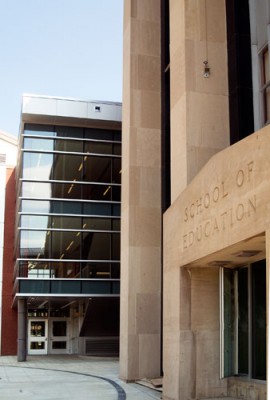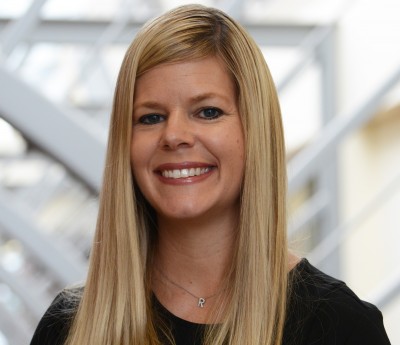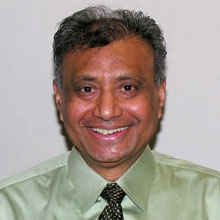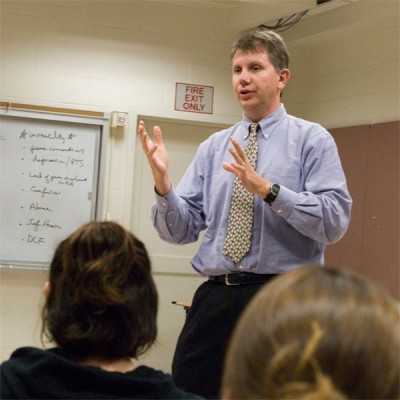
Norwich, Conn.– Kelly Middle School Principal Michael Cain arrived early last Friday for a meeting to review data on students’ reading progress and arrange for tutoring for those who need it.
He stayed late on Thursday to supervise and enjoy the “Back to School” dance attended by more than 300 students, some of whom earned discount reward coupons for their compliance with the school’s new uniform policy and hallway discipline practices.
Cain is three weeks into a busy fall at Kelly, which will open one wing of its $40 million expansion and renovation project in mid-October.
He now has to add another date to his crammed calendar. On Oct. 15, Cain will receive the Excellence in Education Award from the Norwich branch of the NAACP at its annual Freedom Fund Dinner at the Grand Pequot Ballroom at the Foxwoods Resort Casino.
“He has really done a lot in the field of education,” said Jacqueline Owens, president of the NAACP branch. “He has gotten it to the point where the kids are really excited about coming to school and motivated to learn.”
Owens said NAACP awards committee members had spoken to Kelly students and Norwich school administrators in considering Cain for the award.
“They just gave him an excellent recommendation,” Owens said.
Cain said he was honored to be chosen and said the recognition belongs to Kelly staff members, students and parents, all of whom have worked hard to improve the school.
“I’m very happy the NAACP considered me for any type of award,” Cain said, “but any award anyone gives to me comes from the people around me.”
Cain is starting his third year as Kelly principal. He previously served as assistant principal at Wethersfield High School and as a social studies teacher at East Hartford High School. He said he was attracted to the Kelly position because Norwich administrators were asking for someone with a specialty in literacy – a focus for the district, which is trying to improve state test scores.
Cain had earned a master’s degree in reading education from Central Connecticut State University and worked on reading strategies in East Hartford.
Cain credited Kelly teachers and a new method called research based decision-making for improving student performance. By constantly reviewing data on student progress – like Friday’s early morning meeting – teachers learn much more quickly why a student is struggling. Tutors and small-group lessons address the problem early in the school year.
Connecticut Mastery Test scores at Kelly had been disappointing in recent years. The school had been on the state’s “In Need of Improvement” list for four years. Results of last spring’s tests were announced in July, and this time, Kelly celebrated.
Scores improved in nearly every category, the improvements significant enough to lift Kelly into “Safe Harbor” status, exempt from remedial actions by the state.
In mathematics, Kelly students improved by 5 percentage points, with 79.9 percent reaching proficiency, just short of the state goal of 82 percent. In reading, 78.1 percent of Kelly students reached proficiency, a 4 percent jump and just 1 percent shy of the state goal. Economically disadvantaged students, a subgroup watched closely by the state, improved by 6 percent in reading at Kelly.
“In the middle of doing a $40 million building project and moving people around and being a school in need of improvement, he provided some stability there and clear guidance and goals for the school,” superintendent Abby Dolliver said.
Cain loves the new middle school discipline program, Positive Behavioral Supports, but doesn’t take credit for it. William Peckham, principal at Teachers Memorial Middle School, had worked on the program before Cain started at Kelly, and it was implemented during Cain’s first year.
Middle school students spend the first week of school practicing good behavior. They walk to lunch in lines, walk directly and efficiently to their lockers and to their next class.
The lesson can be a challenge, especially for eighth graders who might feel they don’t need to be led through the hallways. But Cain said the behavior becomes habit.
Standing outside the cafeteria Friday morning, Cain watched sixth graders file into the recently renovated, brightly lit room. One boy started to run.
“No running in the hallways,” a teacher said, “Right, Mr. Cain?”
One boy spoke directly to Cain, telling him another boy had punched him and he wanted to chase him.
“I’ll take care of it,” the principal responded.
Cain walked up and down the rows of tables, asking students about their day, their class work and their families. He picked up a notebook and read one girl’s poem about how much she loved fall. Cain beamed. The girl smiled shyly.
“For Mr. Cain, it’s always about the kids,” Dolliver said. “He’ll say that a number of times and you can see that in his actions. He believes it.”
This article was originally published September 27, 2010 in The Day. Reprinted with permission.


 “Without a doubt, the program has opened doors and expanded the minds of what students believe and know is possible for them,” says Rene Roselle, an assistant clinical professor at the Neag School of Education and a consultant from Neag to the Teacher Preparatory Program. “Ideally, a large number of the students who graduate will pursue education as a career and return to urban centers to inspire others to teach.”
“Without a doubt, the program has opened doors and expanded the minds of what students believe and know is possible for them,” says Rene Roselle, an assistant clinical professor at the Neag School of Education and a consultant from Neag to the Teacher Preparatory Program. “Ideally, a large number of the students who graduate will pursue education as a career and return to urban centers to inspire others to teach.”

